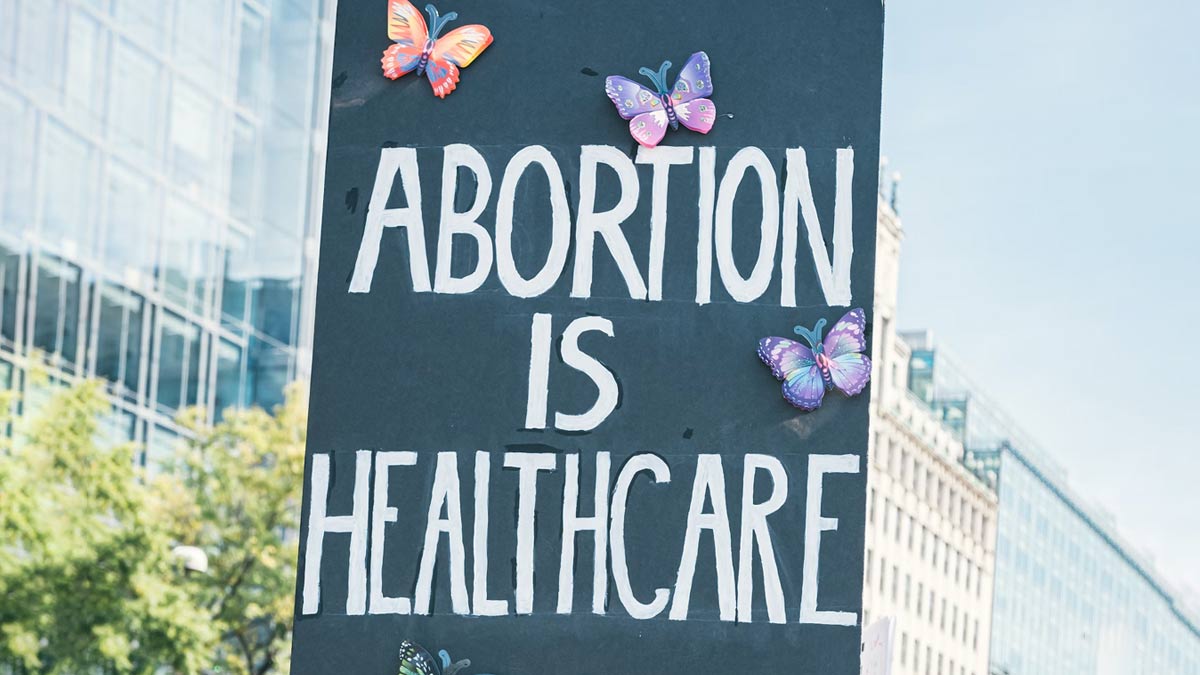Trigger Warning: Mentions rape and child sexual abuse.
Around the time when the United States of America received condemnation from the entire world for criminalising abortion, India was lauded for upholding the constitutional right to safe and legal abortion up to 24 weeks of gestation for all abortion seekers. This progressive ruling of the Supreme Court of India is significant, as it preserves the reproductive and sexual autonomy of women.
In fact, it is the first time, that the Apex Court, in its decision, has expanded the scope of the term ‘women‘ to include people other than cisgender, which furthers the Judiciary’s effort towards equality.
This case came to light, when a 25-year-old, single woman invoked the writ jurisdiction of the High Court, seeking its permission to terminate her pregnancy of 22 weeks under Section 3(2)(b) of the Medical Termination of Pregnancy Act, 1971 (MPT Act) and Rule 3B(c) of the Medical Termination of Pregnancy Rules, 2003 (MPT Rules) on the grounds that her partner had refused to marry her at the last stage and that she was not mentally ready to raise a child due to the social stigma surrounding single parent.

However, the same was rejected by the Delhi High Court on the reasoning that unmarried women are not covered under the ambit of the Medical Termination of Pregnancy Rules, 2003.
Aggrieved by the order of the High Court, she approached the Supreme Court of India, which permitted her to terminate her pregnancy and took up the matter for further consideration as it had a substantial question of law involved.
Discrimination between married and unmarried women
While analysing the law pertaining to abortion, the Bench comprising Justice D.Y. Chandrachud, Justice A.S. Bopanna, and Justice J.B. Pardiwala opined that the intention of the legislature has to be kept in mind while ascertaining the object of the enactment. It further emphasised that law should be readjusted with the evolution of society and should not be deterred by “societal norms.”
Insofar as the MPT Act and MPT Rules are concerned, the object of the MPT Amendment Act, 2021 and MPT Amendment Rule, 2021 is to extend the benefits of safe and legal abortion to all women. However, MPT Amendment Rule, 2021 incorporated a special category of women who were eligible to seek abortion between 20 to 24 weeks under Rule 3B. The non-inclusion of single/unmarried women within the purview of Rule 3B, created some ambiguity as to whether the MPT Act extends the benefit to single women or not.

While construing Rule 3B, the Bench was of the view that since MPT Act is a beneficial legislation, and so it should be granted a “purpose-centric interpretation” so as to meet its true meaning which is access to “safe and legal abortion” for all women.
A narrow interpretation of Rule 3B should be avoided as it is against the “constitutional mandate” and creates discrimination between married and unmarried women. The Bench further highlighted that the non-inclusion of single women from the ambit of the above Rule is based on the patriarchal notion and stereotype that only married women indulge in sexual activity.
Therefore, preventing single/unwed women from accessing legal and safe medical abortion is discriminatory and arbitrary as it runs contrary to the principle of Article 14.
Also Read: A Comprehensive History Of Abortion Laws In India: 1971-2021
Role of RMP vis-à-vis accessing safe abortion
The Apex Court, in this judgment, has also dealt with a number of aspects concerning abortion. One of them is the impediments caused by Registered Medical Practitioners (RMP) in accessing safe and legal abortion.
The current MPT Act is a “provider-centric law”, which means that the opinion of the Registered Medical Practitioner (RMP) is the deciding factor for a woman to terminate her pregnancy. Certain factors influence the decision of RMPs, such as fear of prosecution under the Indian Penal Code, as abortion is a criminal offence under Section 3(1) of the Indian Penal Code unless it is in compliance with the provisions of the MPT Act, and the stigma surrounding unmarried women engaging in premarital sex.
The Bench, while examining this issue, observed that it is due to the refusal of the RMPs to provide services for termination of pregnancy, that women resort to illegal and unsafe ways. It emphasised that it is only the women’s consent that has to be taken into consideration for termination of pregnancy, the rest of the additional requirement has no basis in law.
As a result of these factors, RMPs insist upon women fulfilling certain extra requirements such as a Court order, documentation proof, or permission from family for termination of pregnancy.
The Bench, while examining this issue, observed that it is due to the refusal of the RMPs to provide services for termination of pregnancy, that women resort to illegal and unsafe ways. It emphasised that it is only the women’s consent that has to be taken into consideration for termination of pregnancy, the rest of the additional requirement has no basis in law. Therefore, RMPs should abstain from imposing such additional requirements and only ensure that the provisions of the MPT Act are complied with.
Right to reproductive autonomy
While interpreting the MPT Act, the Bench also reflected upon the reproductive rights of women. It observed that women have the right to make decisions over their bodies. Since pregnancy is connected closely with body autonomy, women have a right to choose whether they want to continue with their pregnancy or not without any pressure from a third person.
The Apex court also stated that a woman has the decisional autonomy to choose the path of her life and as such can choose to bear children irrespective of her marital status. It also highlighted that “Article 21 of the Constitution recognises and protects the right of a woman to undergo termination of pregnancy if her mental and physical health is at stake.”
Also Read: Abortion Decision: Why Does Legislation Override The Choice Of Women?
Abortion rights for minors
With regard to minors, the RMP is mandatorily required to report to the authorities under Section 19 of the Protection Of Children from Sexual Offences Act, 2012 Act when a minor approaches them for an abortion. This is because sexual activities including consensual activities between minors have been criminalised under the POCSO Act.
The Bench, while addressing this issue was of the view that in case of termination of pregnancy of a minor, the MPT Act and POCSO Act have to bead harmoniously in order to safeguard the interest of the minor girl; And, the RMPs are not required to disclose the identity of the minor to the authorities if the same has been insisted by the minor or their guardian.
Marital rape
Most importantly, this judgement also recognises marital rape as rape for the Purpose of MPT Rules and Act. The Apex Court in this regard has observed that “the institution of marriage does not influence the answer to the question of whether a woman has consented to sexual relations.” Thus, an act of sexual assault committed by a husband on his wife would classify as rape within the meaning of Rule 3B(a) of the MPT Rules.

Keeping in mind that marital rape has still not been decriminalised in India, this judgment is the onset of criminalising marital rape in India.
Altogether, this decision is a step forward in advancing women’s rights in the country. Considering the patriarchal system of Indian society, this judgement not only protects women’s intrinsic right to health, safety and decisional autonomy but also aids in changing the stereotypical notion that views women as a baby-making machines.
Also Read: It Is Time Media Got Abortion Reporting Right




